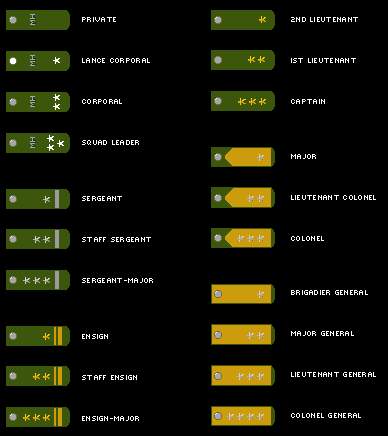area leaving permit: A small booklet, in which the commanding officer writes the time interval of permissions for leaving the base. It should be handed over for military police request, thus proving that the soldier is absent from the base legally.
ArWa: Armed Watcher. An armed soldier on guard at a given spot.
automatic carbine, acb: A hand weapon firing carbine ammunition, with semiautomatic and automatic firing modes. Carbines are sometimes still incorrectly called submachineguns, which belong to a quite different arms class.
CCP: Counter Chemical Warfare.
chemical protective suit: A closed, plastic suit that is said to be protective against chemical and biological warfare.
conscript: Soldier spending his obligatory service. Every male Hungaria citizen is invited to the Hungarian Home Guard for nine months.
TCP: Trespassing CheckPoint. Passing gates can usually be found at important objects or buildings, where a soldier checks the entrants' identity.
guard commander: The commander of the security detachment. Depending on the type of service he can be a conscripted non-commissioned or a professional officer.
KiS: Kitchen Service, a lower ranking officer performing overview of food production and serving during the day.
long leave: Permission to leave the base for a longer period, usually for a weekend. It might end on Sunday evening or Monday morning.
MB: Mobilisation Blocked. Military equipment conseved and prepared for only wartime utilisation. In the Hungarian army it is commonplace to conserve broken, unusable, irrepairable equipment as MB, so they will have great fun during the next war.
MDW: Mass Destruction Weapon.
MH: Military Hospital, the central hospital of the army in Budapest. (In fact MH is also the Hungarian abbrevation for Magyar Honvédség.)
MP: Military Police.
non-commissioned officer: A rank class for low ranking officers.
officer on duty: An officer who performs 24 hour overview service for the unit. He is responsible, among many others, for keeping the order of the base, overview unit services and so.
protective patrol: When the guards are changed in a guard tower, the changed guard comes down, while the new one climbs up, but the spot is unguarded during this operation for a few minutes. For this reason there is always an extra soldier in the patrol, who performs armed watching during the change of guards. Usually a single patrol changes several guards at a time, thus enabling the changed guards to be protectives at the next tower as well.
service chief: At each company there is a lower ranking officer whose duty is to overview daily services, handle equipment and overlook the overall order of the company. He is the service chief.
shift leader: The soldier, usually a non-commissioned, who leads the patrol to the guard towers and changes guards at each shift. The shift leader is usually also the deputy of the guards commander.
short leave: Permission to leave the base for a short period, usually for one afternoon till evening. For non-commissioned officers, the leave can be longer. The short leave permission is only valid for the city in which the base is located.
sub-unit: subordinate unit. Smaller military unit, like a battalion, a company or a squad. In the Hungarian army, the following sub-units are formed:
squadron: 10-12 soldiers, the commander is usually a conscripted
non-commissioned officer.
platoon: 2-5 squadrons, the commander is usually an ensign or a lower
ranking officer.
company: 2-5 platoons, the commander is an officer, usually a 1st
lieutenant or a captain.
battalion: 2-5 companies, the commander is a high officer, like a major or
a lieutenant colonel.
regiment: 2-5 battalions, the commander is a high officer or a general. The
regiment is not a sub-unit any more, it's a unit.
brigade: 2-5 regiments, commanded by a general.
sub-unit duty: a conscripted soldier on a 24 hour duty with the task of keeping the order of the company's quarter. His service area is usually at the end of the quarter's corridor, at the service table, which includes a service telephone. The dutist usually has a deputy, who can substitute him at the table while performing daily tasks like leading the sub-unit to the lunch and back. Usually companies have their own sub-unit service, but smaller independent units, like independent platoons might also have it.
rank: The following ranks and rank insignia are used in the Hungarian Home Guard:

The ranks are sorted in rank categories, which are different from those used in Western and Anglo-Saxon armies, so there is no valid English name for some of them. I will try to give some translation though.
non-commissioned officer: lance corporal, corporal, squad leader. These are
the ranks available for conscripts, the rest are for professional soldiers
only.
sub-officers: sergeant, staff sergeant, sergeant-major.
ensigns: ensign, staff ensign, ensing-major.
officers: 2nd lieutenant, 1st lieutenant, captain.
high officers: major, lieutenant colonel, colonel.
generals: brigadier general, major general, lieutenant general, colonel
general.
The conscripted soldiers don't wear shoulder insignia, only small white stars on their collars, and stripes on their caps and the sleeve of their shirts or mikados.
VRS: Vehicle Reserves Service. A soldier responsible for overviewing the vehicle storage area.
tomcat^grm